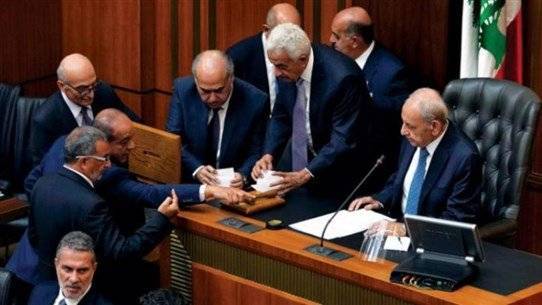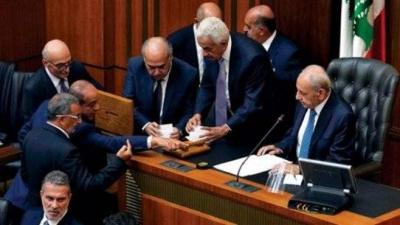As soon as the session to elect the President of the Lebanese Republic was adjourned without setting a date for a second session, legal and constitutional opinions began to diverge regarding the function of the Lebanese Parliament and its role during the period leading up to the end of President Michel Aoun's term on October 31. There is debate over whether Parliament has turned into merely an electoral body or if it still retains the capacity to legislate, pass new laws, and grant confidence to a new government if formed within this month.
The refusal of Parliament Speaker Nabih Berri to set a date for a second session for presidential elections surprised legal and constitutional experts, giving this approach a political dimension. Berri conditioned calling for a new session on securing consensus on the name of the president. However, Paul Marqas, head of the Justice Foundation, argued that “constitutional rules assume that electoral sessions are consecutive without long intervals, and that the council should continue electoral sessions until a president is elected, without interspersing them with legislative or oversight sessions.” Marqas noted in a statement to "Asharq Al-Awsat" that Speaker Berri "interpreted Article 75 of the Constitution literally, which confines the council and makes it an electoral body only if convened. By adjourning the election session (which took place on Thursday), Berri considered that the council was no longer convened; this allows him to reclaim his legislative and oversight powers, based on the assumption that confining the council's role to elections is a restriction that should be interpreted narrowly and not expanded."
The adjournment of the session opened the door to conclusions and interpretations, suggesting that the presidential election is faced with two possibilities: either a settlement or remaining in a vacuum, as has occurred in previous occasions. Lawyer Paul Marqas stated, “In my opinion, it would have been safer to hold continuous sessions without interruption, in light of the aforementioned constitutional rules, especially regarding interpretation within the context of the overall provisions of the Constitution and not through the literal reading of the articles, so that we do not lose the intent of the constitutional legislator who assumed the continuity of sessions to avoid the maze of delays and reaching a vacuum in the presidency, as happened before the elections of both Presidents Michel Aoun and Michel Sleiman.”
Constitutional expert lawyer Said Malek believes that clear constitutional texts do not allow for interpretation or inference. Malek asserts that the council “is now bound to elect the President of the Republic and cannot proceed to legislative sessions.” He emphasized in a statement to "Asharq Al-Awsat" that “Article 49 of the Lebanese Constitution discusses sessions for electing the president, not sessions. These sessions can either take place on the same day or over consecutive days.” He pointed out that “the session that began on Thursday (last week) is still ongoing and cannot be closed except with the election of the President of the Republic.” Malek added, “In the first round, electing the president requires a two-thirds majority of the council members, while for sessions held later, the quorum needed is two-thirds; the president is elected by an absolute majority, which is half the council members plus one—meaning 65 deputies.” He emphasized that “the Constitution renders the parliament merely an electoral body, unable to legislate or grant confidence to the government if formed, unless some wish to interpret the Constitution according to their political biases.”
The perspective provided by legal and constitutional experts contrasts with a different political and constitutional reading from the parliamentary bloc holding the parliamentary card. MP Qassem Hashem from the Liberation and Development bloc believes that “the content of Article 75 of the Constitution is clear—once the first session is adjourned and the minutes are sealed, the council is in need of a new invitation to convene.” He noted in a statement to "Asharq Al-Awsat" that Berri “will call for electoral sessions once consensus on a new president’s name is assured, but pending this consensus, the council may exercise its absolute legislative role.”
Speaker Berri's remarks at the conclusion of the session on Thursday, emphasizing that he awaits the “consensus of the 128 deputies to elect the president and save the country,” were interpreted by observers as a preparation for entering a prolonged phase of vacuum due to the inability to achieve consensus among all Parliament members. However, MP Hashem clarified that “the session yesterday (Thursday) revealed all the cards and directions among the parliamentary blocs, and it dispelled the hope for new alliances.” He stressed that “what happened in the presidential election session shows the need to seek a consensus; no one team can impose its view on the others.” MP Hashem noted the calls for the council to convene by default in the last ten days before the end of President Aoun's term, reminding that “as long as the Speaker of the Council has called for the first electoral session, the mandatory requirement for the council to convene by default has been eliminated, and no session can be held unless the Speaker of the Parliament sets a date for it.”




